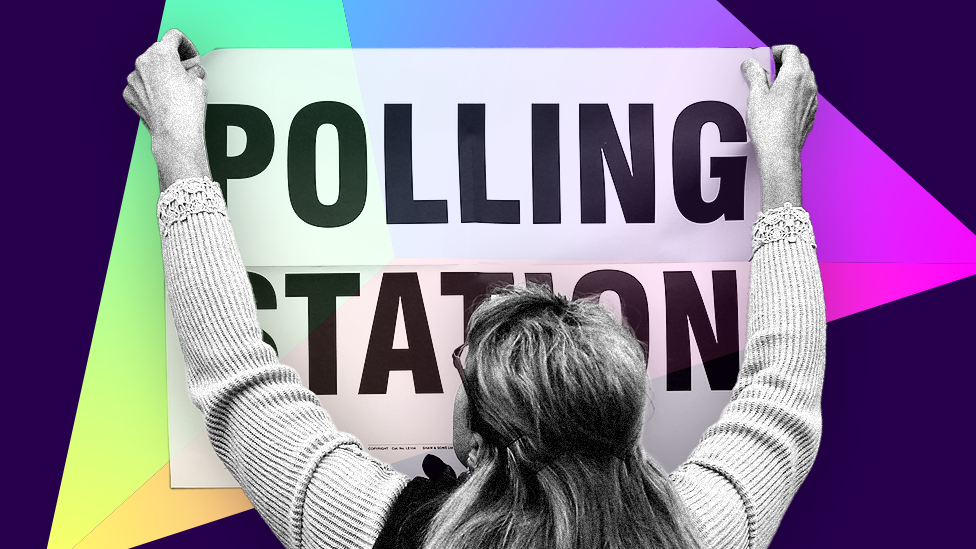Laura Kuenssberg: Rishi Sunak and Keir Starmer have more in common than you might think
- Published
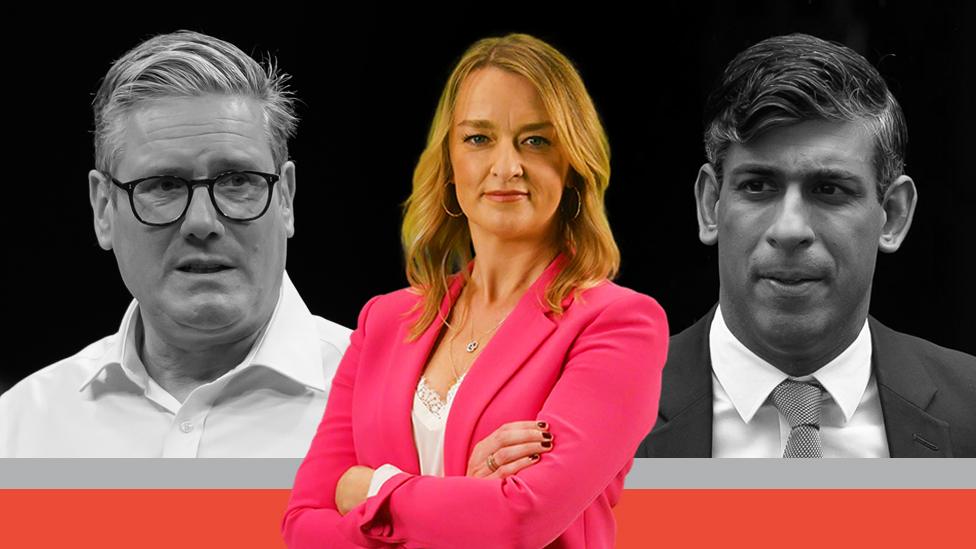
Has it been a shaky start to Rishi Sunak's general election campaign?
"Damn right!", to use the man himself's phrase, except he was talking about whether he would win.
Has his rival Keir Starmer's election begun smoothly?
I'd say, "Damn right!" to that too.
But both men know there is an awful long way to go before a single vote is cast.
They have other things in common too.
Both leaders inspire unusual loyalty among their teams. They are often praised by those who work with them as being warmer than they appear on camera: staffers describe them as decent family men, who take their jobs incredibly seriously and work incredibly hard.
(It's also true that in recent weeks, even close allies of the prime minister report his mood has darkened. One minister told me he had been "catty" and "unpleasant" as pressure has taken its toll.)
They come from different generations. Sir Keir Starmer is 61, and voted in a general election for the first time in 1983, the year Margaret Thatcher won a second term. Rishi Sunak was only three years old then. He cast his first ballot in 2001, when Tony Blair won another term. But neither party leader is a political "lifer".
They became MPs in the same year - 2015 - after successful careers in other fields.

Sign up for the Off Air with Laura K newsletter to get Laura Kuenssberg's expert insight and insider stories every week, emailed directly to you.

The Labour leader's first job was clearing stones from fields on a farm, before studying law and reaching the top of that profession.
The Tory leader helped his mum in her pharmacy, but his first paid job was a waiter in a restaurant, before university and then a highflying career in finance.
Unlike many of their predecessors, these party leaders do not come from political families and have not been steeped from an early age in political intrigue and campaigning. You won't find either of them spinning yarns about drunken shenanigans at long ago party conferences, or carrying grudges about things that happened decades ago in student election campaigns.
They both like to think things through, take time over decisions and test the arguments rather than being ruled by flashes of instinct.
Having got to the top of their parties, they have both been prepared to be ruthless, and compromise to achieve the power they want.
But neither man is entirely comfortable with the showbiz side of modern politics and the intrusion into their personal lives that comes with the territory. They both genuinely appear to enjoy talking to members of the public - but the morning TV sofa, or the glossy magazine shoot, is not something either of them would choose.
They will be on the road for the next month in what is always a gruelling test of endurance for party leaders (although Mr Sunak has raised eyebrows by taking a less frantic day on Saturday, with only a couple of events in his constituency in Yorkshire).

On this week's show are Home Secretary James Cleverly and Labour's shadow chancellor Rachel Reeves
Watch live on BBC One and iPlayer from 09:00 GMT on Sunday
Follow latest updates in text and video on the BBC News website from 08:30
Viewers can send questions or comments to @bbclaurak on x, external or instagram, external and email kuenssberg@bbc.co.uk

Both leaders start their days at the crack of dawn.
Mr Starmer is on the phone to his top team at 06:15, who have already been planning the day.
The first call of campaign managers at Tory HQ is at 05:30.
Mr Sunak keeps going on tea, with the bag left in to make it industrial strength, and munches on cake - lemon drizzle the favourite.
Starmer chooses coffee then maybe a tea later as the day goes on. No sweet tooth and hardly any snacks for him, it seems, just an occasional bag of crisps.
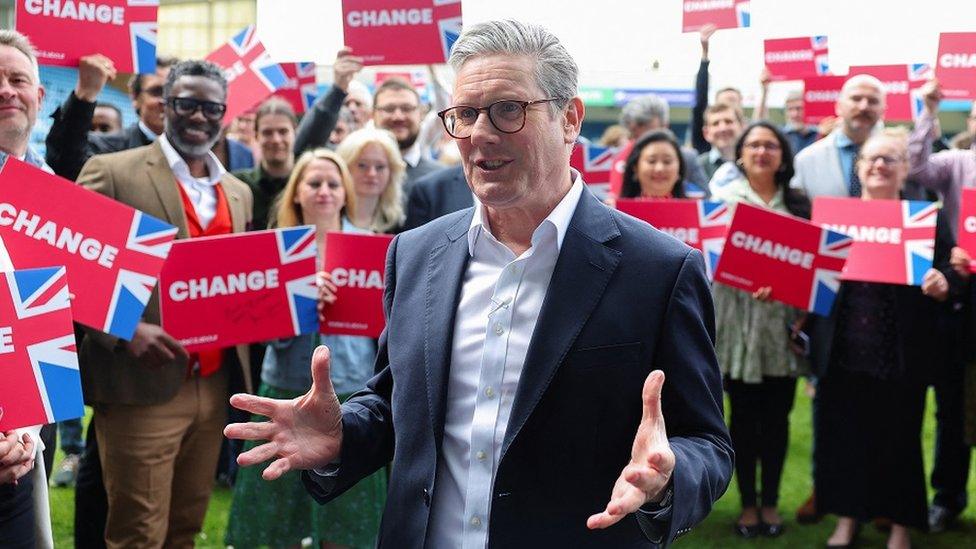
Starmer headed to Gillingham on the first day of campaigning
For all their similarities, the two leaders are in totally different political positions.
Rishi Sunak has been behind and his battered party in the doldrums for months. A cabinet minister tells me "everyone accepts it is pretty unlikely we are going to win the election - it would be a heroic outcome if we can deprive them of an overall majority".
The flip side is that every poll, every pundit, at the moment, expects that Keir Starmer will be prime minister.
Sunak starts in a pretty grim position - although in one sense it is easier to be the underdog.
For Keir Starmer, the fear is a deadly complacency that could set in. His team is insistent that they must keep fighting for the broadest possible level of support - relax or slip up, and their huge hypothetical lead could fall away.
The first act of the 40-day election drama has been totally different for each of them too.
Rishi Sunak has managed to chuck away his first mover advantage. The Downing Street speech in the torrential rain, a photo gaffe picturing him under an exit sign, a planned photocall where the Titanic was built, asking Welsh voters if they were looking forward to a football tournament they aren't in.
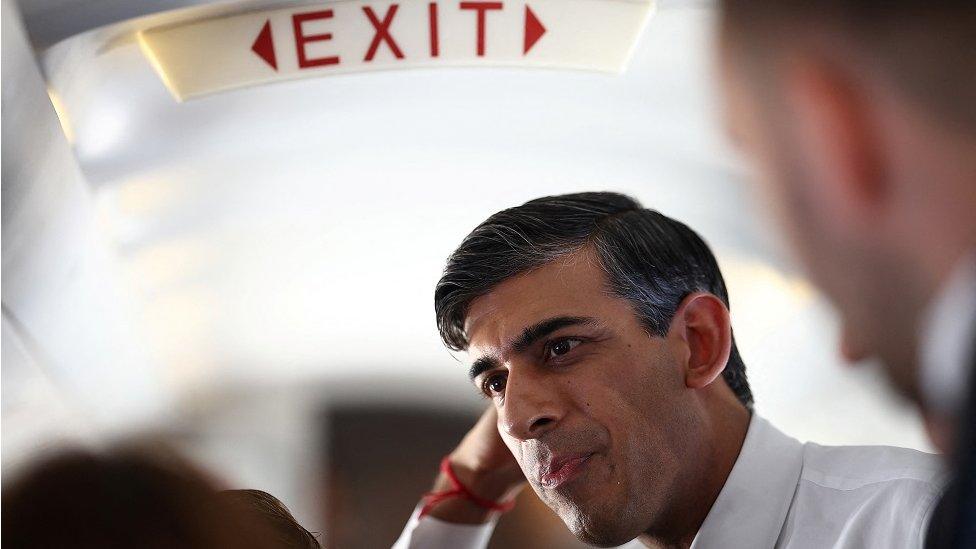
Sunak's photo ops have not gone smoothly
These mistakes are not his fault. But they are campaign mistakes nonetheless, giving the impression in these vital early stages that it's all a bit of a mess.
What is also damaging are the departures of more and more Conservative MPs, including Michael Gove, who had been a prominent personal backer of Mr Sunak himself.
It's impossible not to see the sheer numbers of Tory MPs departing as a reflection of the party's prospects. There are whispers already about unhappiness in campaign HQ in its grand building tucked in behind Parliament Square, concern about a lack of experience in Mr Sunak's team, and suggestions that some of the senior staffers are distracted by trying to find their own seats instead of focusing on the job they are there to do.
At Labour HQ on the other side of the Thames, it is a story of "so far, so good". They didn't know the election was coming on that particular day, yet their plan was conceived months back, just in case.
They had even done what looked like an election launch before it had been called, with Keir Starmer's speech last week on the "first steps" he would take in government.
There have not yet been gaffes, dramas or campaign disasters, although it's a long six weeks and they are highly likely to come. The test of a good campaign is what happens when things go wrong.
Volatile voters
The Labour and Conservative manifestos are not due for another fortnight or so - but expect the Conservatives to soon start releasing plans and policies that are designed to grab your attention.
In contrast, the Labour manifesto is likely only to bottom out what they have already said.
The Tories are behind, so hope to be rewarded if they take some risks. Labour is ahead, so it's safety first, even if it means criticism from their left wing that they are not being ambitious enough and from the Conservatives that there are too many blanks in their programme.
One final thing that unites the two leaders vying to be prime minister is an awareness that in the last few years British voters have proven themselves to be incredibly volatile.
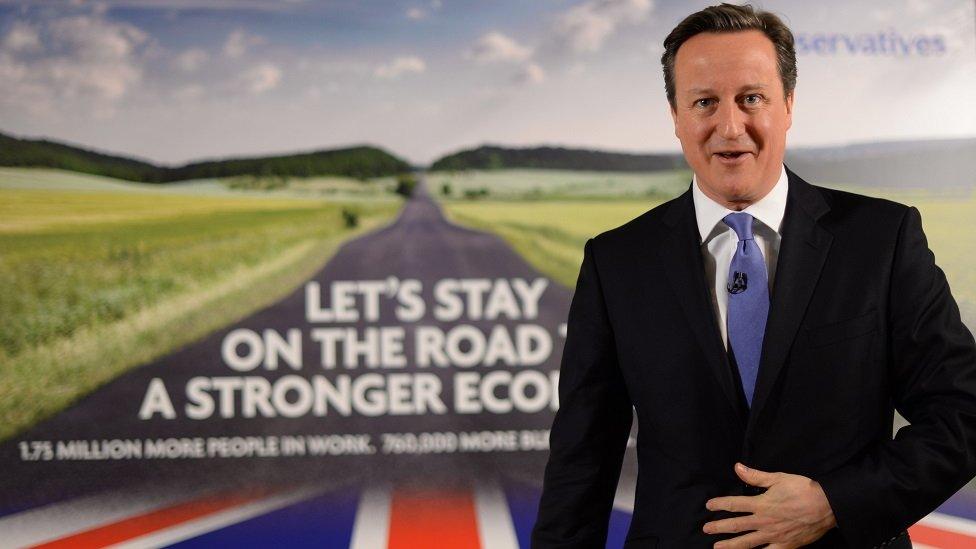
David Cameron won the 2015 election despite a shaky start
There aren't just millions of voters who haven't yet made up their minds. There are millions of voters who have made a decision already, but who might change it by the time of polling day.
I have seen scenarios which suggest the Conservatives could be facing an historic wipeout.
At this early stage in the game, neither side is expecting Rishi Sunak to be able to stay in Number 10.
But sources in both camps say the range of outcomes is still wide within that - from a hung Parliament, to a thumping Labour win.
Unexpected events
And remember, campaigns do change things.
The start of David Cameron's campaign in 2015 was shaky, he even admitted he wouldn't run for a third term, and forgot which football team he supported. A couple of weeks later he won a majority that looked like it had been out of reach.
The beginning of Theresa May's campaign 2017 gave the impression she was cruising to glory. But her early promises of "strong and stable" government crashed to disappointment by the end.
What had looked like a scrappy grassroots campaign from Jeremy Corbyn looked authentic and powerful to many voters by the end and ran the Tories closer than Labour had dared to hope at the start.
Mistakes on both sides are bound to come, and there will be unexpected events to disrupt their best-laid plans.
There are rumblings among the unions about Labour's plans for workers' rights falling short. More big Conservative names could exit. And the smaller parties are capable of changing the outcome too.
Can either Rishi Sunak or Keir Starmer be sure of the outcome?
Dead wrong.
Will it be a wild ride?
Dead right.


What questions do you have about the general election?
In some cases your question will be published, displaying your name, age and location as you provide it, unless you state otherwise. Your contact details will never be published. Please ensure you have read our terms & conditions and privacy policy.
Use this form to ask your question:
If you are reading this page and can't see the form you will need to visit the mobile version of the BBC website to submit your question or send them via email to YourQuestions@bbc.co.uk, external. Please include your name, age and location with any question you send in.
Related topics
- Published3 July 2024

- Published4 July 2024
